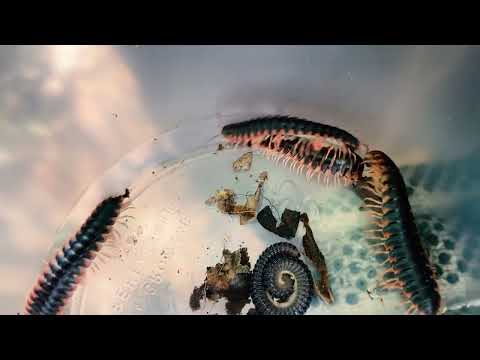MILLEDGEVILLE, Ga., Dec. 5, 2023 /PRNewswire/ — It’s World Soil day and, at Georgia College & State University, Dr. Bruce Snyder and his students are busy researching millipedes—thought to be earth’s first creature to leave water and breathe on land. The creeping, burrowing arthropods are essential for healthy soil and forests.
Yet, despite this critical contribution to the environment, only a handful of scientists in the world study the multi-segmented invertebrate. Snyder’s lab at Georgia College is one of only two labs in the United States, where millipedes are studied.
Little is known about their life. Where millipedes go, what they do, how they interact.
“One of the reasons I like studying millipedes—and one of the reasons why it’s important to study them—is because they are a really diverse group,” Snyder said. “We have lots of different tree species, lots of different understory plant species, tons of insects and earthworms and other things, and millipedes are a big component of that.”
Their legs help millipedes forage and feed, making them the ultimate composters—nature’s No. 1 soldier in waste management. They’re responsible for breaking leafy material into nutritious soil for trees and plants. They speed up forest decomposition, filtering our air and water. They help reduce erosion and keep soil moist.
More than 13,600 species of millipedes have been described worldwide, but only about 110 are found in Georgia—what Snyder calls a “black hole” of information, something he and his students are working to change.
Elena Cruz is a first-year graduate student from Douglasville, Georgia. In her genome project, Cruz is using DNA to sequence the entire genetic code of a local species, Cherokia georgiana—commonly known “as the wrinkled, flat-backed millipede.”
Other students are listing and mapping various species in the state and finding ways to track millipedes.
They’ve found new species too.
“It’s a very big state. There are a lot of places we haven’t explored—that no previous researchers have explored,” Snyder said. “So, every time we put a shovel in the ground, so-to-speak, we’re finding undescribed species or species that are known but new to the state.”
Please see this video and GCSU Front Page stories on millipede research and children’s soil ecology books. For additional information, please contact Cindy O’Donnell at [email protected] or 478-445-8668.
SOURCE Georgia College & State University


